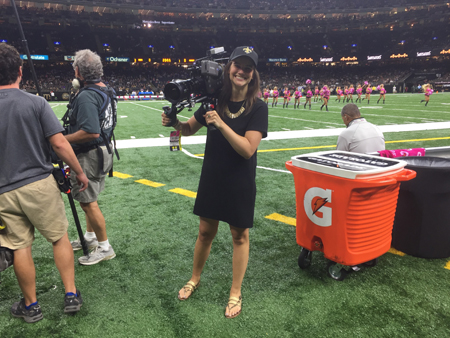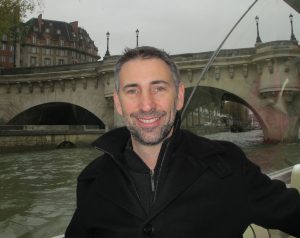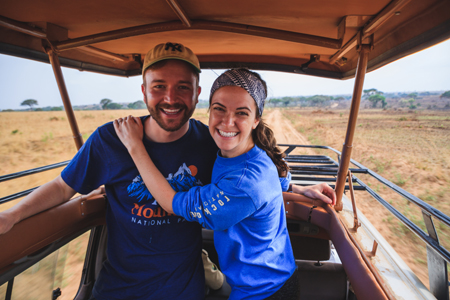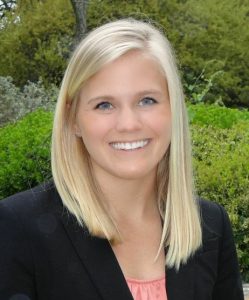 Brittany Johnson, BHP 2012, is the Digital and Social Advertising Manager for the National Football League, where she develops marketing content for digital platforms and works alongside creative agencies developing advertising campaigns. Prior to working for the NFL, Johnson interned with ESPN, and was a producer for Publicis and Grey Group. She is based out of New York City.
Brittany Johnson, BHP 2012, is the Digital and Social Advertising Manager for the National Football League, where she develops marketing content for digital platforms and works alongside creative agencies developing advertising campaigns. Prior to working for the NFL, Johnson interned with ESPN, and was a producer for Publicis and Grey Group. She is based out of New York City.
What kind of content are you producing in your role with the NFL? What are the strategic goals of this content?
I’m part of our advertising team, which is part of our marketing department. I focus on our digital and social content but also have crossover in TV and print. Our team reports to the SVP of Marketing, Creative and Branding, who answers to our CMO, so all our work is pretty high-profile and highly scrutinized. As far as number of campaigns, we have multiple initiatives going on throughout the calendar year including youth, brand, community relations and our product campaigns, like apparel brands or game ticketing. The content we produce varies depending on our demo and the marketing goal, but I would say generally we’re producing video content ranging in length from Snapchats to long-form YouTube episodes.
We work closely with all 32 NFL teams on our various League initiatives and we’re often featuring their players or team events. As a result, I travel to a lot of their markets to capture content with their staff and players, especially over the summer leading up to the season but also in season. Most of what we produce lives on TV, YouTube and our NFL social media channels.
Walk me through the process of rolling out a new campaign.
Our internal team briefs in our creative and media agencies on specific campaign initiatives. Our creative agency develops creative concepts and the media agency finds the right platform(s) based on our targeted fan demographic. There’s a lot of collaboration between the two agencies and I work to manage that relationship to make sure everything is going smoothly. From there, I’m connecting with our different internal teams to confirm approvals on the concepts. Once our creative concepts, scripts, etc are approved, we move into production mode. Productions vary in scale ranging from a small and nimble camera crew of say three people all the way up to a large-scale production with 200 plus individuals contributing in various roles. Our shooting locations vary from team training facilities, to stadiums, to chicken farms, to you name it. As you would imagine, a lot of our advertising campaigns involve our NFL players so that adds another unique responsibility when it comes to our shoots. We always want to make sure they’re comfortable and having fun on set. After shooting the content, we move into multiple rounds of edits until we get to the final content that is approved by all departments. After delivering final content to our media team, I get to sleep.
Do you have a favorite campaign or project you have worked on, or one which really stands out to you?
Our NFL Shop campaign from last season was one of my favorites. We had a really entertaining group of featured players. For one of the spots, I worked with Drew Brees, who went to my high school, which was a surreal and memorable experience. The concept also really relied on dry humor and a little cheekiness which is right up my alley. The campaign featured each of the NFL players describing how hard they had worked to earn their jerseys, hours of practice, years of playing, etc., then the camera pans over to a fan who candidly confesses they just bought the same jersey at NFLshop.com.
What is most challenging and rewarding about your work?
Travel is probably the most challenging and rewarding. I love the travel side of it, but it is unpredictable. Events will pop up and I will have to fly out to capture content very last minute. It’s definitely more unpredictable in the summer, which makes vacation plans difficult to lock down. However, I do get a solid t-shirt tan. Through the travel though, I have been able to see so many cities and meet so many kind people who work in football. I’ve met some incredible people doing incredible work in their communities, and my job is to highlight it. I’m truly lucky to love what I do.
You have worked at ESPN, NFL and even when you were working for the Grey Group, the NFL was one of the clients you were working on. What is it about sports marketing that you enjoy so much?
Obviously, football is huge in Texas, so working in football is kind of a childhood dream. But even beyond that, I think it’s the passion that people feel and express in sports that I love so much. I grew up playing competitive soccer, so I’m not even working in a sport that I grew up playing, but it’s the sports world in general. You see these fanatic fans and players who put in so much hard work every year to become better. It can be fulfilling or it can be heartbreaking. Each year there’s a sense of hope for everyone in the sports world to cling to no matter what happened in the past season. That passion and hope is contagious. Marketing in general is compelling to me because of the psychology involved. Putting myself in our fans’ shoes to think about what they would be interested in seeing and hearing allows you to be a more empathetic and self-aware human.
How do you think your BHP and Marketing degrees from McCombs have aided you in the work you are doing?
In terms of competitive workplaces and highly sought-after positions, BHP sets the standard. I didn’t get into BHP as a freshman, so I had to work incredibly hard to earn my spot as a sophomore. From BHP, you learn if there is something you want to achieve you have to work hard and be humble. New York is also very competitive so I’ve continued to work hard to get where I am. I worked on an additional NFL project for 6 months on top of my existing role when I was at Grey Group. 6 months after that project wrapped up, I got a call from my now current boss about this job because I had worked tirelessly on the previous project. Serendipitous.
For students interested in working as a digital producer, what advice do you have for them?
You have to be a people person. So much of what you do relies on relationships and being able to relate to people. You also have to be a detail-oriented person and definitely can’t be a pushover. A lot of times you are going to hear no, but you still have to figure out a way to get it done. Persistence is key.
If you had it to do over again, would you do anything differently?
No, because I am so happy where I am now. I wouldn’t change anything because I don’t know if I would end up in the same place. I have only been in my position for a little more than a year, so I am still learning so much. I feel like I can make more of an impact this year now that I have experienced a full season. I don’t think when I came to New York I thought I would be here this long, but now I am kind of addicted to the pace of it and the opportunities here. When I travel for a while, I really miss it and look forward to coming back to New York. My heart will always be in Texas though.


 Like most BHP students, I started my career with a desire to achieve as much as possible. A 1991 BHP graduate, I started at Andersen Consulting (now Accenture) in 1992 after getting my MBA at McCombs. I worked at Accenture for 22 years, 12 as a partner in Accenture’s Strategy practice. Focusing on organization change, leadership, and employee engagement, I worked on some of Accenture’s largest global accounts at places like Exxon, Chevron, Cargill, and DuPont. Along the way, I enjoyed exciting work; fantastic teams; and the opportunity to be on the inside of some of the biggest companies in the world. I also earned 4 million airline miles, and though that sounds great, the travel began to take a toll on my health and well being.
Like most BHP students, I started my career with a desire to achieve as much as possible. A 1991 BHP graduate, I started at Andersen Consulting (now Accenture) in 1992 after getting my MBA at McCombs. I worked at Accenture for 22 years, 12 as a partner in Accenture’s Strategy practice. Focusing on organization change, leadership, and employee engagement, I worked on some of Accenture’s largest global accounts at places like Exxon, Chevron, Cargill, and DuPont. Along the way, I enjoyed exciting work; fantastic teams; and the opportunity to be on the inside of some of the biggest companies in the world. I also earned 4 million airline miles, and though that sounds great, the travel began to take a toll on my health and well being.

 Laura Rosen, BHP 2004, is a Senior Policy Analyst and Outreach Coordinator for the Center for Public Policy Priorities, where she manages program strategy, advocacy, marketing and communications for their job quality and asset building work. Prior to joining the CPPP, Laura worked for Wells Fargo. She completed a master’s degree in public policy with a concentration in social enterprise and economic development from the University of Michigan’s Ford School of Public Policy.
Laura Rosen, BHP 2004, is a Senior Policy Analyst and Outreach Coordinator for the Center for Public Policy Priorities, where she manages program strategy, advocacy, marketing and communications for their job quality and asset building work. Prior to joining the CPPP, Laura worked for Wells Fargo. She completed a master’s degree in public policy with a concentration in social enterprise and economic development from the University of Michigan’s Ford School of Public Policy. Elaine Posluszny graduated from BHP in 2014 and went to work for Deloitte Consulting, doing healthcare strategy work. She has recently moved back to Austin to work for the new Dell Medical School as Assistant Director for Care Transformation, where she is involved in operational and strategic planning for new clinics opening in 2017.
Elaine Posluszny graduated from BHP in 2014 and went to work for Deloitte Consulting, doing healthcare strategy work. She has recently moved back to Austin to work for the new Dell Medical School as Assistant Director for Care Transformation, where she is involved in operational and strategic planning for new clinics opening in 2017.